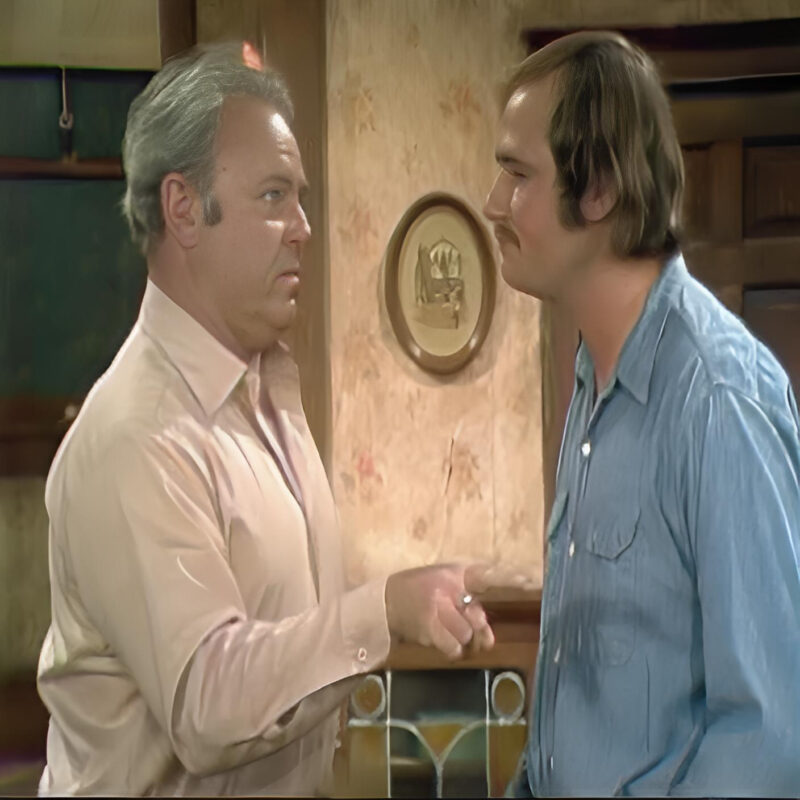
It took three pilots and multiple cast changes before “All In The Family” finally debuted on CBS in the fall of 1971. The show, which became a groundbreaking television classic, had an intricate and fascinating journey to the small screen.
Norman Lear, the creator of the show, initially envisioned Mickey Rooney as the perfect choice for the central character, Archie Bunker. However, Rooney declined the role, concerned about how audiences would react to Bunker’s overt bigotry and disdain for blacks, gays, and “commies.” This decision opened the door for Carroll O’Connor, who would go on to become one of the most iconic television actors of the decade.
Another well-known actor, Harrison Ford, was also offered a role in the show. He turned down the chance to play Bunker’s ultra-liberal son-in-law, Michael “Meathead” Stivic. The role was initially played by Tim McIntire in the original ABC pilot. When that episode was reshot with former Oakland Raiders linebacker Chip Oliver, the network still passed on the show. It wasn’t until Rob Reiner stepped in that “All In The Family” finally got the green light from rival network CBS.
The final cast of “All In The Family” included Jean Stapleton as the doting wife, Edith Bunker, and Sally Struthers as Bunker’s “little girl,” Gloria. Interestingly, Reiner’s wife, Penny Marshall, was also considered for the role of Gloria, but producers chose Struthers because she more closely resembled O’Connor.
Fascinating Tidbits About “All In The Family”
1. Jean Stapleton’s Finale Farewell
One of Jean Stapleton’s last TV performances was on the first season of “Everybody Loves Raymond,” where she played Doris Roberts’ sister. Stapleton and Roberts had been friends for a long time, and Roberts had even appeared as a bar patron in the 1976 episode, “Edith’s Night Out.”
2. O’Connor and Stapleton’s Reunion
O’Connor and Stapleton reunited in 1991 on the syndicated Donny and Marie daytime talk show. It was the first time they had appeared together on screen since “All In The Family.” Despite requests from Donny and Marie, they refused to do their Archie and Edith voices.
3. Original Name
The show was originally titled “Justice For All,” and the lead character was named Archie Justice. The name change to “All In The Family” was one of many adjustments made to perfect the show.
4. Inspiration for Edith’s Voice
Jean Stapleton developed Edith’s distinctive voice while appearing in a stage production of “Damn Yankees.” She explained on the Donny and Marie show that she “found a nasality which I thought would lend itself to that kooky character.”
5. Contract Dispute
In 1974, Carroll O’Connor did not appear in five episodes due to a contract dispute. Lear even threatened to kill off his character if the dispute was not resolved. Fortunately, the issue was settled, and O’Connor returned to the show.
6. Spin-offs
“All In The Family” spawned an impressive seven spin-off series: “The Jeffersons,” “Maude,” “Good Times,” “Archie Bunker’s Place,” “Gloria,” and “702 Hauser Street.” After “All In The Family” ended, O’Connor unsuccessfully sued Lear for profits from “The Jeffersons.”
7. Theme Song Secret
Carroll O’Connor wrote the lyrics to the show’s closing theme song, “Remembering You.” Although the lyrics are not featured on the show, he received a co-writer credit and royalties. O’Connor even performed the tune in a rare recorded session.
Reflecting on the Legacy
“All In The Family” was not just a television show; it was a cultural phenomenon that tackled controversial social issues with humor and sensitivity. Archie Bunker, with all his flaws, represented a segment of America that Lear wanted to address and challenge. The show’s success can be attributed to its bold writing, strong performances, and the willingness to confront topics that were often avoided on television.
Jean Stapleton’s portrayal of Edith Bunker was crucial to the show’s impact. Her ability to bring warmth and depth to a character that could have easily been one-dimensional earned her multiple Emmy nominations and three wins. Edith’s innocence and unwavering love for her family provided a perfect counterbalance to Archie’s bluster and prejudice.
Carroll O’Connor’s Archie Bunker became an icon, embodying the complexities and contradictions of the American everyman. O’Connor’s commitment to the role and his collaboration with the writers ensured that Archie was more than just a caricature.
Rob Reiner and Sally Struthers also brought significant depth to their roles as Michael and Gloria. Their on-screen chemistry and the generational conflicts they represented were central to the show’s narrative and its exploration of societal changes.
Conclusion
The journey to bring “All In The Family” to television was filled with challenges and changes, but the result was a show that left an indelible mark on American culture. It pushed boundaries, sparked conversations, and paved the way for future sitcoms to tackle serious issues with humor.
As we remember Jean Stapleton, Carroll O’Connor, and the rest of the talented cast and crew, we celebrate a show that was not afraid to hold up a mirror to society. “All In The Family” remains a testament to the power of television to entertain, educate, and provoke thought, ensuring its place in the annals of TV history.
